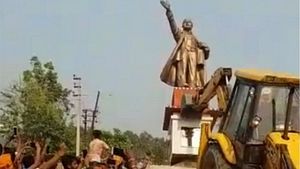Between two consecutive Mondays, India was witness to the end of a two-and-half-decade idea based on socialist and communist principles, as well as the unshakeable power that is possible in a march of about 35,000 women and men.
Last week, a statue of Communist icon Vladimir Ilyich Ulyanov, better known as Lenin, was brought down in the state of Tripura, in India’s northeast. The 11.5-foot-tall statue, which had been standing tall in one of the towns of Tripura for five years, was brought down amid cries of “Bharat Mata Ki Jai,” as the Bharatiya Janata Party (BJP) won the state elections, bringing to an end the 25-year successful rule of the Communist Party of India (Marxist).
The jingoistic celebration of the win, which prompted the Indian media to decry a saffron cover over the once-red state, was followed by various instances of attacks on CPI(M) members across Tripura. The election result also marked significant victory by BJP in the neighboring northeast states of Nagaland and Meghalaya.
The political winds had changed direction in Tripura. The toppling of Lenin’s statue was a reminder of the ways in which the power-hungry overturn the old seats of power. It didn’t take long for H Raja, the leader of the BJP in the southern state of Tamil Nadu, to comment that the same fate would be meted out to a statue of social reformer Periyar.
Outrage followed and Raja deleted his post on Facebook, but Periyar’s statue was defaced. During the week, the statues of Dalit social reformer and architect of the Indian Constitution, BR Ambedkar, and that of erstwhile politician Syama Prasad Mookerjee were also vandalized in different cities.
What had held Tripura together – and what had eventually led to the rise of Hindu nationalist Rashtriya Swayamsevak Sangh (RSS), the BJP’s parent organization — was the idea brought in by the simple personality of Manik Sarkar, Tripura’s chief minister for 20 years. He had restored peace and communal harmony in a state infested with violent insurgency and cross-border terrorism and strife, with Bangladesh as its neighbor. True to his Communist principles, Sarkar gave away his entire salary to the party, did not own any property, or even a car; his retired government official wife used public transport. After the election results, he stepped down from power with equal grace, and moved to live in the CPI(M) office.
It is in this sobering context that the fall of Lenin’s statue seems like a saffronized India’s attempt at actively rewriting history. But just when the idea of a politically plural India might seem to be lost, about 35,000 farmers walked 180 kilometers for six days straight from rural Mahashtra, towards Mumbai, to make themselves heard. With red flags and utter discipline on the streets of the metropolis, suffering blisters on their feet and carrying mini solar panels on their head to charge their mobile phones, these men and women walked to the city when the politicians wouldn’t get to them.
With a set of demands – an unconditional waiver on loans and electricity bills, a minimum support price for their farm produce, implementation of guidelines towards safeguarding smaller farmers, compensation for crop losses, implementation of the Forest Rights Act towards safeguarding land ownership rights, end to the forceful acquisition of land – they marched on through one of Mumbai’s arterial highways. Late Sunday night, the farmers, led by the All India Kisan Sabha, decided to walk up to a large open ground through Sunday, so as not to inconvenience the thousands of students who were sitting for various major exams.
The humility of the farmers was not lost on the city, as people welcomed them with water, biscuits, food, garlands, at various locations. By Monday evening, a nervous government agreed to all of the demands of the farmers, while also making arrangements for their safe return to their homes by train.
Lenin and his Communist ideas from another time and land may have been forced to fall last week, but those 35,000 men and women who toil on farmlands truly showed the transformative power of the united workers.

































